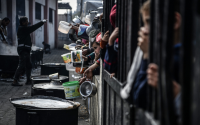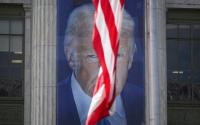 Iraqi PM Nouri Maliki wants support from his neighbours |
3 May 2007
That is certainly one of the hardest questions facing this region and the world at the moment.
It is the reason more than 50 countries and many more organisations have come together here in Sharm el-Sheikh.
It is also the reason that the tantalising prospect of America sitting down at the same table and talking face-to-face with Iran and Syria hangs over this gathering.
There are two days and two parts to this meeting.
Difficult targets
Day one will see the signing of the International Compact with Iraq.
This is a five-year economic plan sponsored by the United Nations.
It offers help with development and reconstruction, aid and investment and, crucially, debt relief.
But it is dependent on Iraq meeting some difficult targets and making significant economic and political reforms.
Much of the Saddam-era debt has already been forgiven but the country is still thought to owe at least $56bn.
America wants all of this debt written off. The gestures are likely to be generous but not to that extent.
Significant announcements are expected from Saudi Arabia and some Gulf countries.
However, there has been resistance from others, most notably Kuwait.
Day two is the Ministerial Conference on Iraq which brings together foreign ministers from neighbouring countries, the five permanent members of the United Nations Security Council, the G8 industrialised nations, the Arab League and many others with a stake in Iraq's future.
 Baghdad wants to address its "security and terrorism" issues |
It will be a chance to discuss security issues, political developments, the reconciliation process and how the neighbours, the region and the international community can (and should) help.
The trouble is that almost every delegation has its own diagnosis and remedy for Iraq's problems.
For its part, Baghdad thinks the issue is primarily one of "security and terrorism".
Iraq is expected to present its own plan but resist calls for a new reconciliation process or pressure to rehabilitate former members of Saddam Hussein's government.
It wants more co-operation and support from its neighbours - and less "interference".
Reciprocal feelings
Arab countries think the main challenge is political not security.
For much of the Middle East, especially the Sunni world, the best way to resolve Iraq's problems is to embark on a far more thorough reconciliation process, bringing more Sunnis into the political process.
 The high-level meeting brings together friends and foes |
"The steps taken so far are not enough," one senior Arab diplomat told me.
Iran and Syria think America is the biggest problem and want US forces to withdraw.
The feeling is reciprocated. America thinks Syria and Iran are a significant part of the problem.
Washington consistently accuses both of allowing arms and fighters to flow across their borders into Iraq - "our number one issue", according to Nicholas Burns, US under-secretary of state with responsibility for Iran.
Neither the US nor Iran has ruled out the chance that they might meet to discuss these issues.
If they do, it will be the most significant face-to-face contact between the two countries in the six years since the Bush administration came to power.
But both have insisted that any talks would solely be on Iraq, not on the many other thorny issues that plague relations.
Common cause
"Iraq is a disaster by any count," a senior Arab diplomat told me.
He frowned and lowered his voice, confiding his fears: "but it can still get worse, much worse".
There are significant differences here over exactly what the most serious problem is and who or what is responsible.
There also some fundamental divisions over how best to bring peace and prosperity to the country.
But it is that final thought - that as bad as things are they could still deteriorate - that has brought everyone here.
Friend and foe alike do have a common cause - now they must find common ground.






